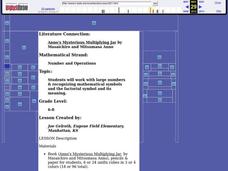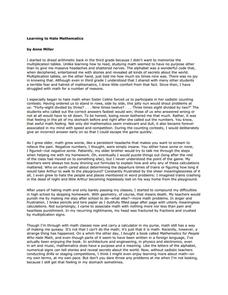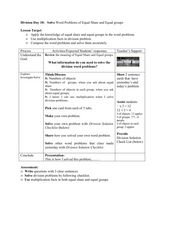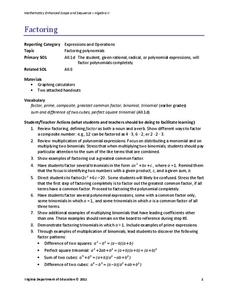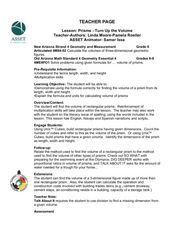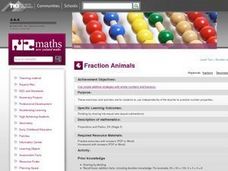Curated OER
Dividing By 2 and 5
Third graders divide by 2 and 5. In this math lesson, 3rd graders label the parts of a division sentence. Students solve division sentences using multiplication.
Curated OER
Third Grade Math Review
This third grade math review PowerPoint addresses the math concepts that were taught during the school year. This interactive PowerPoint is a "Jeopardy" style review game and addresses concepts such as addition, subtraction,...
Helping with Math
Worksheet: Dividing by 6
In this division worksheet, pupils first complete 10 problems, multiplying the numbers 1-10 by the divisor six. They can use the answers to help solve 28 division problems, thus relating multiplication and division. The webpage includes...
Curated OER
A Math Game for Reinforcing Computation Skills
Students practice a variety of math skills. In this math computation activity, students follow the rules of the game and keep track of their own scores. Students review skills for addition, subtraction, multiplication and division.
Curated OER
The Multiplier (small 2-digit by 1-digit numbers)
Second graders study digits in 2- or 3-digit whole numbers. They write and solve story problems which involve whole numbers, using addition, subtraction, multiplication, or division.
Helping with Math
Worksheet: Dividing by 7
In this division-focused assignment, youngsters first complete 10 problems, multiplying numbers 1-10 by seven. They then use the answers to help find 28 quotients where the divisor is always seven. The webpage includes the link to an...
Helping with Math
Worksheet: Dividing by 2
Multiply by two, and then divide by two. This learning exercise provided practice for beginning dividers. Note that the publisher assigns this to CCSS.Math.Content.3.OA.6, but you would need to do some explaining to actually get this and...
Curated OER
"Anno's Mysterious Multiplying Jar" by Masaichiro and Mitsumasa Anno
Students work with large numbers and recognizing mathematical symbols and the factorial symbol and its meaning.
Curated OER
students rotate through four workstations that reinforce the concept of symmetry
Second graders, in pairs, use arrays to explore the relationship between multiplication and division.
Curated OER
Word Problem Solving Strategies
In this word problem solving strategies worksheet, 6th graders solve and complete 11 different problems and questions related to identifying word problems. First, they explain what the problem is telling them to do and what is important....
Curated OER
Multiplying Large Numbers Using the Grid Method
In this math activity, students multiply large numbers using the grid method. Students split the number into hundreds, tens and units. Students draw a grid, multiply, and add. Example: 324x7 = 300x7 plus 20x7 plus 4x7. Students solve 26...
Curated OER
Disappearing Magic Factors
Learners identify, through the number of rows and columns, the factors related to the product. In turn, they also discover how to find the missing factor, which is part of the fact family for that product.
Curated OER
Two-Digit Divisor
In this two-digit divisor worksheet, students solve and complete 4 different types of problems. First, they find the maximum number of times that a number goes into another number. Then, students list the number of times and check their...
Curated OER
Calculate It
Fourth graders find the area and perimeters of squares and rectangles using a calculator to check their multiplication. They use the appropriate formulas to find the area and perimeter of the given geometric shapes.
Curated OER
Wild and Wetlands
Upper graders identify the major characteristics of a wetland. They explore the human factors that change a wetland and write a descriptive paragraph about wetlands. This comprehensive lesson also has an interactive "Watershed Game"...
Curated OER
Learning to Hate Math
Give your class a different kind of reading assignment with the text included here. Anne Miller's essay "Learning to Hate Mathematics" details a hatred of math that grew from early childhood and still haunts the author today. After...
Curated OER
Solving Equations
In this Algebra II worksheet, 11th graders use the properties of equality to solve multi-step equations in one variable. The tow page worksheet contains explanation, guided examples, and fifteen practice problems. Answers are not...
Curated OER
Solve Word Problems of Equal Share
Youngsters solve division word problems. They will make their own division word problems using objects in equal groups. They share how they solved their problem with the class. Division worksheets are included to support the process....
Curated OER
Yummy Gummy Subtraction
Here is a quick 15 minute lesson intended to introduce subtraction. Learners count and subtract gummy bears to complete 5 problems. The lessons suggest that the gummy bears can be saved and used the next day, but gummy bears get gross...
Curated OER
Conditional Probability and Probability of Simultaneous Events
Your statisticians examine the characteristics of conditional probability and the probability of simultaneous independent events. They perform computer activities to find probabilities for simple compound events. They examine the...
Virginia Department of Education
Factoring
Uncover the relationship between factoring quadratics and higher degree polynomials. Learners develop their factoring skills through repetition. A comprehensive instructional activity begins with quadratics and shows how to use the same...
Curated OER
Multiplying by 10, by 100, and by 1,000
Fourth graders write tenths and hundredths in decimal and fraction notations. In this math instructional activity, learners know the fraction and decimal equivalents for halves and fourths. Everyone answers numerous questions posed by...
Curated OER
Prisms-Turn Up The Volume
Identify the length, width, and height of prisms. Critical thinkers calculate the volume of prisms given small amounts of information. They derive the formula given the length, width and height.
Curated OER
Fraction Animals
Second, third, and fourth graders explore fraction strategies and division by splitting sets of farm animals into equal numbers. Independently, they read word problems, solve them, and check their answers.









